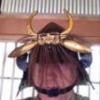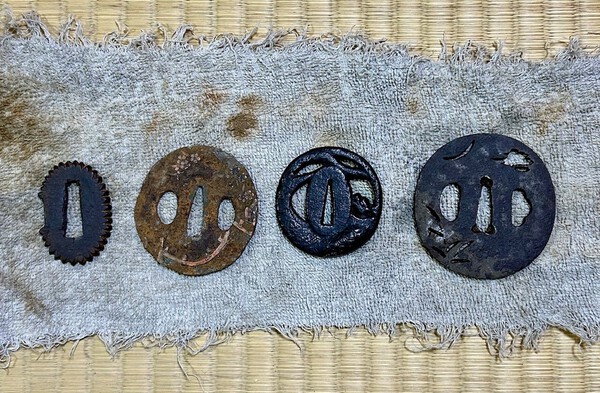-
Posts
14,476 -
Joined
-
Last visited
-
Days Won
284
Content Type
Profiles
Forums
Events
Store
Downloads
Gallery
Everything posted by Bugyotsuji
-

Could I get a translation on the signatures here
Bugyotsuji replied to Lewis B's topic in Translation Assistance
-

Could I get a translation on the signatures here
Bugyotsuji replied to Lewis B's topic in Translation Assistance
赤尾清夫 Normally Akao Kiyoo but that personal name (second two Kanji) could be read several ways. One of the Akao school. Seio, Seifu, etc. …(?) -
Possibly meant to be Nobumune…(?) + Kao, but the strokes are not quite right. 信宗
-

This might be pushing my luck a bit🙂 but……
Bugyotsuji replied to Matsunoki's topic in Translation Assistance
I think it says it’s a joint work between the four people named, dated an auspicious day of Showa 7. (Rich colours. Interesting thing! ) PS I am sure there are no cracks in your walls! -
Ah, you spotted that! (I'm not just a pretty, er, handsome face)
-
-
Over the last week I have been attempting to recatalog my small assortment of kozuka, menuki, and tsuba on this side of the planet. It's confusing because I have a different set of numbers at either end, and when I carry some backwards or forwards the numbers can clash, needing renumbering. There were a couple of tsuba I do not remember buying, and for some reason left no record of how much I paid. Aaarrrgghhh... While doing so though, I rediscovered several that I had forgotten, or was thinking that I had swapped out or sold. It was a joy to see them again, and to consider that years ago I had appreciated them enough to have chosen them back then. Some of them I would never sell, I realized, as they speak to me personally and it is not a question of market value. It was a delight to hold them in hand and to find new aspects or details to appreciate. Why collect these things, people ask? Well, one answer could be that as my Alzheimer symptoms progress, I will soon be able to experience the joys of rediscovery as often as there are weeks in the year or days in the week! "A thing of beauty is a joy forever." Endymion, John Keats.
- 5 replies
-
- 13
-

-

-
This thread, and the other one linked, has opened my eyes to Teimei tsuba. Many thanks. I had one a couple of years ago without knowing what it was, but I think I must have given it away as part of a deal. The shape of your new tsuba reminded me of square iron hooks hammered into old Japanese building walls and pillars, or those adorning the uprights of shokudai candle holders, but I am more than happy to go with sashigane!
-
Top left, John, looks like the outer box of two nesting boxes.
-
Shotoku Taishi holding a sashigane. https://www.google.com/search?client=safari&hs=jbFp&sca_esv=24bda720f578b1cc&hl=en-gb&udm=2&fbs=ADc_l-aN0CWEZBOHjofHoaMMDiKp9lEhFAN_4ain3HSNQWw-mMGVXS0bCMe2eDZOQ2MOTwnRdx8cTjotWVyC2QMTVww_YBFX02fOeR-h4YTkfXLtUjsbkEQ71TRGYdTT7QocLO7g195D6ib_0dpEb3QJhPc8RuH5fi-Zj0WZCt67f8e5UnyfeSxo0pAD9Pd3ZdooYNG4m6TtZkeX60E_yiJ6whrL47XaLA&q=差金骨董&sa=X&ved=2ahUKEwi86_Tgx6-SAxX8slYBHdUTMLEQtKgLegQIFBAB&biw=390&bih=699&dpr=3&aic=0#sv=CAMShgUa5gQKkAIKuQEStgEKd0FNbjMteVRsdWdUcE1xMUJpWUxLRW1hRnFqbC0taEE0NzluekFPbHpHRi1ySHgwOUstLVVZeWNDRHJRVUdrNEh4WHlkZmthSkMwMlpoUzVYT2J5dVdPajJuLXBqaTZ5VlVwbEFvOUlhMC1tZkF3NkNPOEFJQ1hvEhc5cko2YWM3WklMeUEycm9QdU8yQm9RURoiQUpLTEZtS0ZrZGp3OWlQQm1sQTU0NEFFWkFpdWd5RkZ6dxIDODQ5GgEzIhEKAXESDOW3rumHkemqqOiRoyIHCgN0YnMSACIuCgRlcWxkEiZDZ0lJQUJBQUtBRTZCQWdCRUFGQUFVZ0JWVjJYWVQ5dFZ1b2ZQdxK-AgrPARLMAQqMAUFNbjMteVQzQjY1OHBGSkxwMjQxekU5RmhfeWR4cHFTMm9UUzVJQkUxLVRKU0pZSllYaXByX1BxRkxRYWpya0dnRGZaZ0VKUnV4VWc0YndSYUZYV3FUS2ZFNkg0alNvc3hNa3pzYWhlcGF3cG0zVzZHcS1FZjNkOWxIT1FJVUtmd3N4NWtITUt4cHlIEhc5cko2YWM3WklMeUEycm9QdU8yQm9RURoiQUpLTEZtS3J6UXZUZHFsdjQwd2xkSzRmc2NJUV9yWWFFdxIENDY5OBoBMyIYCgZpbWdkaWkSDkpUb284aHFxU2JwZjJNIhcKBWRvY2lkEg5hZm1mSGhTY2tzdHhzTSIuCgRlcWxkEiZDZ0lJQUJBQUtBRTZCQWdCRUFGQUFVZ0JWVjJYWVQ5dFZ1b2ZQdyoQZS1KVG9vOGhxcVNicGYyTSAEKhcKAXMSEGUtSlRvbzhocXFTYnBmMk0YATABGAcg8tejpQ4wAUoKCAEQAhgCIAIoAg
-
Yes, liking that, simple but strong. Does it actually say that they are carpenter's squares? (Took a long time to work its way through!) Congratulations.
-
Smaller, for ojime perhaps? Do they have crisscross schreger lines internally like elephants and mammoth tusks? Learn something new every day!
-
When you say barrow, it does indeed look like a seoibitsu armo(u)r chest with shoulder straps. (Nearly bought one just last week!)
-
Good point. Although some of them are made of elephant ivory, it is not easy to say what others might be, and I've never come across elk teeth before.
-
Unfortunately I think you are right, Jeremy. Possibly she bought them before the stringent ivory laws were introduced under Obama, but none of them look really old.
-
Despite the fuzzy shots I get a strong feeling (especially from the classical Chinese clothing) of Chōhi and the oath in the peach garden. Three Kingdoms. https://ja.wikipedia.org/wiki/桃園の誓い
-
Unfortunately Jeremy, more of the same as above. Designed in okimono form a couple of holes were added to give a somewhat netsuke appearance. Same comments apply. Fairly modern, Chinese, and sadly looks like ivory which will make it illegal to buy or sell in most countries. The sticker likely added to make it look like an ex-museum piece.
-

Kozuka signed Otsuryuken Shozui (乙柳軒政随): Authenticity check
Bugyotsuji replied to Guzewski's topic in Tosogu
Great question. I have a piece too, but feel the need to reserve final judgement. -
Chris, my immediate thought is Tada 忠
-
Actually as it's unsigned I think the 'Soten-style' wording is better than outright 'Soten school'. Strictly speaking these were made within the *Hikone Han, the Soten being a line of smiths within that area, the earliest ones signing their work. Becoming popular, later they were apparently emulated elsewhere in Japan. I have a similar one, papered by the NBTHK as 'Hikone'. *Think of Hikone Castle, home of the Ii Daimyo family.
-

Can anyone help me with these Shibuichi (I think!) plaques?
Bugyotsuji replied to Laura's topic in Other Japanese Arts
Saw some sets of those buttons at an antiques fair the other day. Not cheap! -
Maybe an X-ray would pick up more definition?
-
Alex, that is painful to look at. I am in danger here of breaking the 11th Commandment. ”Thou shalt not covet thy neighbour’s sword.”






